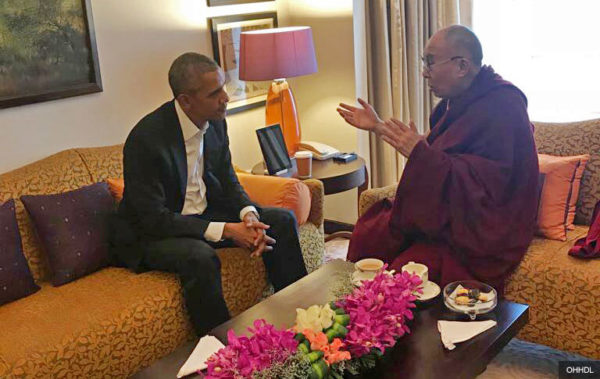 Former President George W. Bush and the Dalai Lama. By Brendan Smialowski/Bloomberg/Getty Images.
Former President George W. Bush and the Dalai Lama. By Brendan Smialowski/Bloomberg/Getty Images.
It was big news last weekend when President Obama refused to let journalists into his private meeting with the Dalai Lama. The maneuver reflects increasing concerns in the U.S. that emphatic public support for the Tibetan leader will alienate Chinese officials, and in turn jeopardize our strategic interests in the world’s fastest growing economy.
Like the president, a rising number of international billionaires have begun to worry that backing the Dalai Lama could pose a risk to their personal wealth by potentially limiting access to lucrative markets in China. Years ago, before surging Asian industry became a force impossible to ignore, such fears were remote, if they existed at all, for the American super-rich. But now that the seat of financial power has started shifting eastward, patronage of the Dalai Lama can come at a considerable cost.
Not too long ago, a member of a prominent dynastic family I know was organizing a conference that included an official appearance by His Holiness, the Dalai Lama. It turned out that one of the primary challenges of arranging the event was recruiting other affluent sponsors to lend their names to the cause. The conference facilitators told me privately that several distinguished billionaires had expressed their commitment to the ideals of the convention, but they had refused to participate openly. To make matters worse, a few of the individuals who did agree to bolster the program with the weight of their bold-faced names didn’t want to show up in person because of the potential backlash it might cause. It was a classic demonstration of wealth’s definitive triumph over traditional integrity.
Representatives of the Dalai Lama appear to be aware of the escalating disadvantages they face. While making the rounds on the elite social circuit, I’ve encountered Buddhist monks who have traveled all the way to the U.S. from Dharamsala, India, to recruit the crucial support of well-heeled benefactors. One of them, a naturally unassuming man with virtually no knowledge of English, gave me prayer beads and explained through an unofficial translator that he had recently been to the posh ski resort Sun Valley. His presence there seemed to underscore the urgency the Dalai Lama and his followers feel about gathering a new network of influential allies.
Sadly, China’s increasing sway over our economy compromises the Dalai Lama’s ability to attract wealthy American patrons. The opportunity to make money is something billionaires simply can’t resist—even if giving in to that persistent urge means shunning an enlightened spiritual guru.
The One Percent by Jamie Johnson
Via: VanityFair

